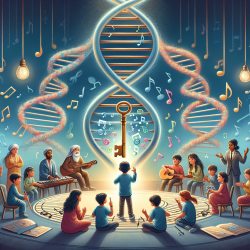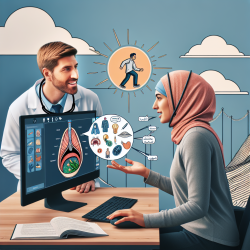Unveiling the Genetic Blueprint of Musical Aptitude
As a speech-language pathologist dedicated to enhancing children's outcomes, the intersection of genetics and musical aptitude presents a fascinating frontier. The research article "Genome-wide linkage scan for loci of musical aptitude in Finnish families: evidence for a major locus at 4q22" offers compelling insights into the genetic underpinnings of musical talent. This study not only enriches our understanding of musical aptitude but also opens new avenues for therapeutic interventions.
The Genetic Basis of Musical Talent
Conducted on 15 Finnish multigenerational families, this study employed a comprehensive genome-wide linkage scan. The researchers identified significant genetic contributions to musical aptitude, pinpointing a major locus at chromosome 4q22. The heritability estimates were substantial, indicating that genetic differences explain a significant portion of musical ability variance among individuals.
These findings suggest that musical aptitude is not merely a result of environmental factors but is deeply rooted in our genetic makeup. The study's results align with previous observations that musical talent often clusters within families, hinting at a hereditary component.
Implications for Speech-Language Pathology
Understanding the genetic basis of musical aptitude can revolutionize therapeutic approaches for children. Here are some ways practitioners can leverage this knowledge:
- Personalized Therapy: By recognizing the genetic predispositions in children, therapists can tailor interventions that align with their innate abilities, enhancing engagement and outcomes.
- Early Identification: Genetic insights can help identify children with potential musical talents early, allowing for timely interventions that nurture these abilities.
- Cross-disciplinary Approaches: Integrating music into speech-language therapy can stimulate brain areas involved in both music and language processing, potentially benefiting children with speech and language disorders.
Encouraging Further Research
The study's findings are a starting point for further exploration into the genetic determinants of musical aptitude. Researchers and practitioners are encouraged to delve deeper into how these genetic insights can be translated into practical applications. Collaboration between geneticists, neuroscientists, and speech-language pathologists could lead to innovative therapies that harness the power of music to enhance cognitive and linguistic development.
Conclusion
The genetic link to musical aptitude offers a promising pathway for enhancing therapeutic practices. By integrating these insights into speech-language pathology, practitioners can create more effective, personalized interventions that capitalize on children's innate abilities. As we continue to unravel the genetic code of musical talent, the potential for transformative outcomes in therapy is immense.
To read the original research paper, please follow this link: Genome-wide linkage scan for loci of musical aptitude in Finnish families: evidence for a major locus at 4q22.










